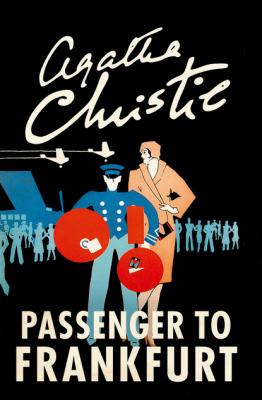Passenger to Frankfurt. Agatha Christie
Чтение книги онлайн.
Читать онлайн книгу Passenger to Frankfurt - Agatha Christie страница 12
 no, Colonel Pikeaway, it’s Sir George Packham.’
no, Colonel Pikeaway, it’s Sir George Packham.’
‘Pity,’ said Colonel Pikeaway, breathing asthmatically. ‘Great pity. The Reverend McGill is far more amusing. There’s a splendid touch of hell fire about him.’
‘Shall I bring him in, Colonel Pikeaway?’
‘I suppose he will expect to be brought in at once. Under Secretaries are far more touchy than Secretaries of State,’ said Colonel Pikeaway gloomily. ‘All these Ministers insist on coming in and having kittens all over the place.’
Sir George Packham was shown in. He coughed and wheezed. Most people did. The windows of the small room were tightly closed. Colonel Pikeaway reclined in his chair, completely smothered in cigar ash. The atmosphere was almost unbearable and the room was known in official circles as the ‘small cat-house’.
‘Ah, my dear fellow,’ said Sir George, speaking briskly and cheerfully in a way that did not match his ascetic and sad appearance. ‘Quite a long time since we’ve met, I think.’
‘Sit down, sit down do,’ said Pikeaway. ‘Have a cigar?’
Sir George shuddered slightly.
‘No, thank you,’ he said, ‘no, thanks very much.’
He looked hard at the windows. Colonel Pikeaway did not take the hint. Sir George cleared his throat and coughed again before saying:
‘Er—I believe Horsham has been to see you.’
‘Yes, Horsham’s been and said his piece,’ said Colonel Pikeaway, slowly allowing his eyes to close again.
‘I thought it was the best way. I mean, that he should call upon you here. It’s most important that things shouldn’t get round anywhere.’
‘Ah,’ said Colonel Pikeaway, ‘but they will, won’t they?’
‘I beg your pardon?’
‘They will,’ said Colonel Pikeaway.
‘I don’t know how much you—er—well, know about this last business.’
‘We know everything here,’ said Colonel Pikeaway. ‘That’s what we’re for.’
‘Oh—oh yes, yes certainly. About Sir S.N.—you know who I mean?’
‘Recently a passenger from Frankfurt,’ said Colonel Pikeaway.
‘Most extraordinary business. Most extraordinary. One wonders—one really does not know, one can’t begin to imagine …’
Colonel Pikeaway listened kindly.
‘What is one to think?’ pursued Sir George. ‘Do you know him personally?’
‘I’ve come across him once or twice,’ said Colonel Pikeaway.
‘One really cannot help wondering—’
Colonel Pikeaway subdued a yawn with some difficulty. He was rather tired of Sir George’s thinking, wondering, and imagining. He had a poor opinion anyway of Sir George’s process of thought. A cautious man, a man who could be relied upon to run his department in a cautious manner. Not a man of scintillating intellect. Perhaps, thought Colonel Pikeaway, all the better for that. At any rate, those who think and wonder and are not quite sure are reasonably safe in the place where God and the electors have put them.
‘One cannot quite forget,’ continued Sir George, ‘the disillusionment we have suffered in the past.’
Colonel Pikeaway smiled kindly.
‘Charleston, Conway and Courtfold,’ he said. ‘Fully trusted, vetted and approved of. All beginning with C, all crooked as sin.’
‘Sometimes I wonder if we can trust anyone,’ said Sir George unhappily.
‘That’s easy,’ said Colonel Pikeaway, ‘you can’t.’
‘Now take Stafford Nye,’ said Sir George. ‘Good family, excellent family, knew his father, his grandfather.’
‘Often a slip-up in the third generation,’ said Colonel Pikeaway.
The remark did not help Sir George.
‘I cannot help doubting—I mean, sometimes he doesn’t really seem serious.’
‘Took my two nieces to see the châteaux of the Loire when I was a young man,’ said Colonel Pikeaway unexpectedly. ‘Man fishing on the bank. I had my fishing-rod with me, too. He said to me, “Vous n’êtes pas un pêcheur sérieux. Vous avez des femmes avec vous.”’
‘You mean you think Sir Stafford—?’
‘No, no, never been mixed up with women much. Irony’s his trouble. Likes surprising people. He can’t help liking to score off people.’
‘Well, that’s not very satisfactory, is it?’
‘Why not?’ said Colonel Pikeaway. ‘Liking a private joke is much better than having some deal with a defector.’
‘If one could feel that he was really sound. What would you say—your personal opinion?’
‘Sound as a bell,’ said Colonel Pikeaway. ‘If a bell is sound. It makes a sound, but that’s different, isn’t it?’ He smiled kindly. ‘Shouldn’t worry, if I were you,’ he said.
Sir Stafford Nye pushed aside his cup of coffee. He picked up the newspaper, glancing over the headlines, then he turned it carefully to the page which gave Personal advertisements. He’d looked down that particular column for seven days now. It was disappointing but not surprising. Why on earth should he expect to find an answer? His eye went slowly down miscellaneous peculiarities which had always made that particular page rather fascinating in his eyes. They were not so strictly personal. Half of them or even more than half were disguised advertisements or offers of things for sale or wanted for sale. They should perhaps have been put under a different heading but they had found their way here considering that they were more likely to catch the eye that way. They included one or two of the hopeful variety.
‘Young man who objects to hard work and who would like an easy life would be glad to undertake a job that would suit him.’
‘Girl wants to travel to Cambodia. Refuses to look after children.’
‘Firearm used at Waterloo. What offers.’
‘Glorious fun-fur coat. Must be sold immediately. Owner going abroad.’
‘Do you know Jenny Capstan? Her cakes are superb.
Come to 14 Lizzard Street, S.W.3.’
For a moment Stafford Nye’s finger came to a stop. Jenny Capstan. He liked the name. Was there any Lizzard Street? He supposed so. He had never heard of it. With a sigh, the finger went down the column and almost at once was arrested once more.
‘Passenger from Frankfurt, Thursday Nov. 11, Hungerford